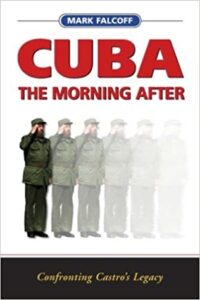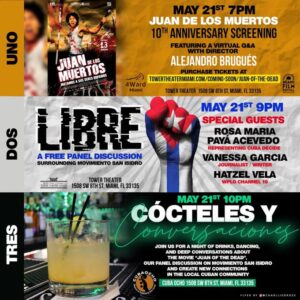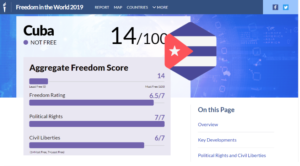In formulating a response to the recent protests in Cuba, the U.S. administration should listen to activists on the ground, argues Amalia Dache, an Afro-Cuban American associate professor at the University of Pennsylvania. Because of the regime’s propaganda, U.S. liberals and conservatives can find their policy preferences wrapped up in U.S. racial and domestic politics about Cuba in a way that does not happen with a dictatorship like North Korea, she writes for Foreign Policy:
The U.S. embargo matters less to the average Cuban than what I’ll call the internal blockade the regime uses to make a profit and punish its people.* For example, even under the trade embargo, U.S. producers are allowed to sell food and medicine to Cuba. The regime buys about $100 million worth of chicken from U.S. producers annually but sells it as a luxury good….. What can the U.S. government do? It can rally the global community, especially countries that regularly trade with Cuba, to support the protesters by focusing attention on the regime’s racist human rights abuses.

Cuba-Lex
Suggestions that the United States should explore potential intervention with allies in Cuba play into the hands of the regime and have riled Cuban Americans who have studied the island’s historical struggles over its sovereignty, The Times reports.
“This is the kind of thing that the smartest voices in civil society in Cuba know is really foolhardy,” said Michael J. Bustamante, an assistant professor of Latin American history at Florida International University who studies Cuban American political culture.
Cuba’s civil society and democratic movement has played a fundamental role in the protests, says sociologist Elaine Acosta, a researcher at Florida International University’s Cuban Research Institute, citing the San Isidro and 27N movements.
There have been precedents of an incipient civil society, which has suffered permanent harassment by state institutions, continuous surveillance, and imprisonment, but even so, they have kept making this set of problems visible and articulating demands. So, of course, what the snapshot of July 11 does is to amplify all this and break the myth that dissent is only sectoral and linked to an enlightened elite, she tells the Review of Democracy’s Stefano Palestini.
 The Communist authorities’ response to the protests has been draconian, Ernesto Londoño and
The Communist authorities’ response to the protests has been draconian, Ernesto Londoño and
In interviews, people who protested and their relatives described panicky conversations inside homes and among neighbors about what shape the crackdown may take in coming days. Cubans employed by the state fretted about their job security. Those with detained relatives expressed fear that speaking out would lead to harsher treatment for their loved ones.
“There’s a ferocious campaign to paint all of them as delinquents,” said Elaine Díaz, the founder of Periodismo de Barrio, an independent news outlet that has published videos and podcasts with firsthand accounts from detained protesters. “We went from a state of fear to a state of terror.”
 Making an example
Making an example
“This practice of detentions has the effect of making an example out of people,” said Laritza Diversent, the director of Cubalex, a human rights organization begun in Cuba but now based in the United States that provides legal aid to dissidents. “The rest of society becomes inhibited from participating in new demonstrations.”
Back in 2003, the Latin Americanist Mark Falcoff wrote a whole book about Cuba post-dictatorship: Cuba: The Morning After. The morning after could be horrible beyond present imagining. Nevertheless, that morning is pleasant to contemplate — interesting to contemplate — as well as sobering, Jay Nordlinger writes for The National Review:
 In 2011, I interviewed Óscar Biscet, who had just been released from prison, after twelve years’ confinement. He spoke of two prisons: “the little prison,” Combinado del Este, the infamous place where he and many other dissidents have been locked up and tortured, and “the big prison,” which is Cuba at large. “We who live under this dictatorship look to the sea and know that the sea is our prison bars,” Biscet said. “This great, beautiful island of Cuba has been converted by the Castro brothers into their own personal estate.”
In 2011, I interviewed Óscar Biscet, who had just been released from prison, after twelve years’ confinement. He spoke of two prisons: “the little prison,” Combinado del Este, the infamous place where he and many other dissidents have been locked up and tortured, and “the big prison,” which is Cuba at large. “We who live under this dictatorship look to the sea and know that the sea is our prison bars,” Biscet said. “This great, beautiful island of Cuba has been converted by the Castro brothers into their own personal estate.”
The recent protests in Cuba bring back painful memories for 81-year-old Cuban American, ABC News reports (above).
The U.S. Senate has passed a bipartisan bill to rename the street outside of the Cuban Embassy in Washington, D.C. as “Oswaldo Payá Way,” one of its backers, Sen. Marco Rubio writes:
An early critic of the Castro regime, Payá founded the Christian Liberation Movement (Movimiento Cristiano Liberación, or MLC for its initials in Spanish) in 1988 to promote democracy and civil liberties through non-violent resistance. A decade later, the organization established the Varela Project, which sought to advance democratic reforms by exploiting a provision in the Cuban Constitution that allows the public to introduce legislation.
 Payá’s daughter, Rosa María, wants the U.S. to apply individual sanctions on top officials and individuals abusing human rights in Cuba by making use of the Global Magnitsky Act, Vanessa Garcia writes for The National Review, and also asks that:
Payá’s daughter, Rosa María, wants the U.S. to apply individual sanctions on top officials and individuals abusing human rights in Cuba by making use of the Global Magnitsky Act, Vanessa Garcia writes for The National Review, and also asks that:
- the U.S. approach Cuba as it did apartheid: requiring companies to embrace the Sullivan Principles, which call for them to support human rights in places where they do business;
- the U.S. help provide Internet access to Cubans, bypassing the censorship of the regime, which controls all lines of communication into and out of the island;
- the U.S. invite the European Union and the Organization of American States (OAS) to take similar steps and to use all the tools at their disposal, including the Inter-American Treaty of Reciprocal Assistance, to address threats posed by the Cuban regime;
- the regime continue to be excluded from the Summit of the Americas until it complies with the Inter-American Democratic Charter.
Tourism sustains regime
 The Cuban government has been very public about its intentions to build its economic future on tourism. The regime’s current development plan foresees the construction of over 100,000 new hotel rooms by 2030, along with 24 new golf courses. And spending on new hotel and real estate ventures now far outstrips shrinking budgets for health, education, agriculture and science combined, writes CBC’s Evan Dyer:
The Cuban government has been very public about its intentions to build its economic future on tourism. The regime’s current development plan foresees the construction of over 100,000 new hotel rooms by 2030, along with 24 new golf courses. And spending on new hotel and real estate ventures now far outstrips shrinking budgets for health, education, agriculture and science combined, writes CBC’s Evan Dyer:
President Miguel Diaz-Canel has called tourism “the locomotive of the Cuban economy” and once told national deputies that “what we have on a weekly basis to pay credits, to buy raw materials and to invest, comes from tourism.” …..As U.S. hotel company Marriott discovered last year, it is virtually impossible to operate on the island today without enriching what is already the country’s richest institution: the Revolutionary Armed Forces.
Yet Cuban hotel workers take home only a tiny fraction of what their counterparts in Cancun or the Dominican Republic earn for similar work, Dyer adds. Guest workers from India working on one hotel were paid ten times more than their Cuban peers.

YouTube screen capture
Wilfredo León (right) – the Cristiano Ronaldo of Volleyball – is one in a long string of Cuban volleyball greats who have abandoned their homeland, writes for The New York Times:
Most leave to seek not only the riches of a professional career but also, perhaps, a national team program that has the resources to house its developing stars in dormitories without leaky roofs, an organization that can provide consistent running water and standard medical treatment when injuries occur…..He was also living for long stretches on the top floor of a dormitory where rain poured through the ceiling and he had to lug two buckets of water from a nearby well up four flights of stairs to bathe or do his laundry.
“In Cuba, they tell you when you are growing up that all the great champions of the past have suffered through these conditions, that the suffering will help you become the best,” León said. “It is not true. To give your best you need good facilities, a nice place where you can rest, good food, doctors. That is the only way you can have a long sporting life.”
Frustration is natural when the same leadership 62 years after the revolution is still asking you to make huge sacrifices. Fewer and fewer Cubans have hope that prosperity will eventually come, adds FIU’s Acosta.
 Penn State University has issued a statement explaining the removal of a quote from Fidel Castro from a wall at the university’s Paul Robeson Cultural Center, noting that “The draconian rule, harsh punishments, and resulting climate of fear within Cuba by the source of the quote, cannot be diminished.”
Penn State University has issued a statement explaining the removal of a quote from Fidel Castro from a wall at the university’s Paul Robeson Cultural Center, noting that “The draconian rule, harsh punishments, and resulting climate of fear within Cuba by the source of the quote, cannot be diminished.”
STRATFOR Chairman George Friedman discusses the recent protests in Cuba and dives into the past, present, and future of its geopolitical importance.
*The Center for a Free Cuba confirms the point, citing a recent meme on social media and a commentary from Cuban analyst Carlos Alberto Montaner which detail the “internal blockade” imposed by the regime. Remittances continue to flood Cuba from the exile community in South Florida. RTWT
How a Cuban Émigré Became a Polish Volleyball God https://t.co/hwCrByLQ67
— Democracy Digest (@demdigest) August 2, 2021







